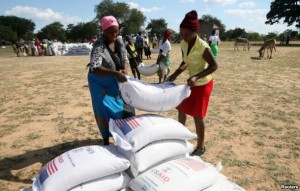HARARE — In Zimbabwe, a human rights commission reports that the government is giving food aid to supporters and withholding it from opponents. A coalition of aid groups has voiced concern about the report, while the government has denied the allegations.
Last week, the Zimbabwe Human Rights Commission said it found evidence of political bias in the distribution of relief aid by the government. Areas that support the ruling ZANU-PF party were getting food, it said, while areas that support opposition parties were not.
The Ministry of Social Welfare denied the allegations Monday as “unsubstantiated and seemingly malicious.†It said the charges denigrate a program that has the “keen interests†of President Robert Mugabe.
During the weekend, the 92-year-old leader weighed in on the issue.
“And the information, which some stupid people and stupid spokesman of is it Human Rights [Commission] put out, say grain is being distributed along party lines, is completely false, absolutely false,” Mugabe said.
He added that Human Rights Commission chairman Elston Mugwadi had been influenced by Western countries who he said sponsor the commission.

Villagers queue to collect their monthly food aid ration of cereals at a school in drought hit Masvingo, Zimbabwe, June 2, 2016.
Early this year, Zimbabwe made a plea for assistance to feed more than four million people — nearly a third of the population — after a severe drought reduced the harvest.
Oxfam’s director in Zimbabwe, Machinda Marongwe, says his aid agency “was deeply concerned†with the Zimbabwe Human Rights Commission findings. He called for aid to be distributed according to principles of humanity, neutrality and impartiality.
A coalition of more than 20 NGOs said it welcomed the “bold and timely intervention†by the Human Rights Commission, and called on the government to refrain from manipulating food aid as a way of gaining political support before Zimbabwe’s next elections in 2018.
Post published in: Featured


